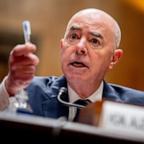Filipino Muslim Rebels Tied to Afghan War
Aug. 31 -- Like many international terrorists, the Abu Sayyaf group has its origins in the 1979-89 jihad or “holy war” to expel the Soviets from Afghanistan.
And like alleged terrorist mastermind Osama bin Laden, it has been financed by Saudi Arabia’s wealthy elite and influenced by Wahabism, an ultra-conservative form of Islam that dates from mid-18th century and is espoused by the Saudi royal family.
Abu Sayyaf was the last of the seven main Afghan guerrilla groups to be formed, and organized late in the war — only about three years before the Russians withdrew.
Abu Sayyaf, which means “father of the sword” in Arabic, was founded in 1986 by an Afghan professor named Abdul Rasul Abu Sayyaf.
Some of the original veterans of the Afghan jihad, and their sons and grandsons and those trained by them, have been operating with destructive effect since the 1980s from Egypt and the Philippines to Algeria and New York.
Deadly University
As the Soviet Union withdrew its troops from Afghanistan in 1989, the CIA’s powerful Pakistani partner, the ISI (Inter-Services Intelligence Directorate) found itself losing control of the Afghan fighting groups.
Although the ISI continued to train and equip some for warfare against India in Kashmir and Punjab provinces, Abu Sayyaf had also established a “university,” north of Peshawar, Pakistan, to train terrorists in the methods taught by the CIA and ISI.
Senior Pakistani police officials said it trained terrorists for the Philippines, the Middle East, North Africa — and New York — and a senior Pakistani officer acknowledges that 20,000 volunteers were trained in the Peshawar “university” and that after the 1979-89 war ended, the alumni “looked for other wars to fight.”
Abu Sayyaf moved operations to the Philippines, ostensibly to support the generations-long battle for an independent Muslim state in the southern islands.




